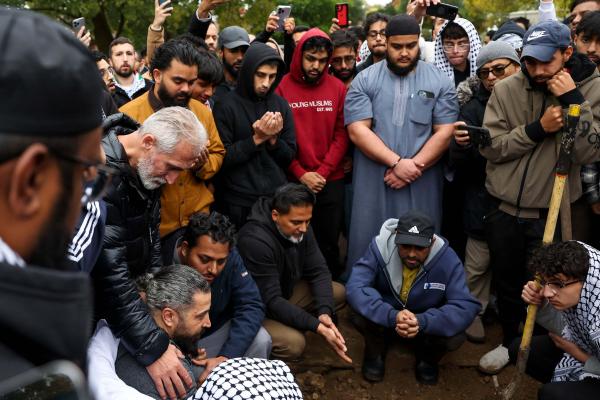On Oct. 14, 6-year-old Wadee Alfayoumi was stabbed to death in a Chicago suburb. Joseph Czuba, the 71-year-old man who stabbed Alfayoumi is a longtime member of a church and, according to the Will County sheriff’s office, was motivated by anti-Muslim sentiments and Israel’s war against Hamas. According to Joseph’s wife, Mary Czuba (who has filed for divorce), he had been radicalized by conservative talk radio.
I live in a Chicago suburb and am the associate regional minister of American Baptist Churches Metro Chicago. When I heard Alfayoumi had been killed, I was horrified; as a mother, a Christian, a faith leader, and most of all a human, I took the news extremely hard.
I wasn’t the only one who was saddened by the news. And recently, a group of people began organizing around a resolution dedicated to Alfayoumi. The Wadee Alfayoumi resolution, or H.R. 942 /S.R. 589, would honor Alfayoumi’s life and heritage, and denounce hate speech and hate crime against Palestinians and Muslims. It was introduced in the House by Rep. Delia Ramirez (D.-Ill.) on Dec. 19, 2023, and in the Senate by Sen. Dick Durbin (D.-Ill.) on March 14, 2024.
On May 19, I joined other faith leaders at the First United Methodist Church at the Chicago Temple to show support for the resolution. I believe this resolution is needed as anti-Palestinian and anti-Muslim hate crimes have spiked since October 2023 — something Congress has not denounced. Meanwhile, the House of Representatives has passed five pieces of legislation addressing the issue of antisemitism since that time. This contrast is glaring.
Around the same time that Alfayoumi was killed, Israel was escalating its war with Gaza, and there was a claim that 40 babies had allegedly been beheaded and burned by Hamas, the militant Palestinian organization opposing Israel. That claim was false. It was initially spread by a journalist reporting for an Israeli news outlet, and then repeated by President Joe Biden on Oct. 11.
Experts say biased, dehumanizing reporting on Muslims and Arab Americans contributes to increased Islamophobia in what is known as “backlash effect.” The backlash effect is a phenomenon whereby global events have an impact domestically. Dehumanizing reporting is not the only thing contributing to spikes in hate crimes but as Crystal Silva-McCormick argues, this “messaging creates a bias that can then lead to violence.”
Clearly, words spoken by political leaders and media outlets matter a great deal. The authors of the Wadee Alfayoumi resolution acknowledge this, stating in its text that “dehumanizing misinformation and disinformation fuels sentiments of hate that result in violence against those who belong or who are perceived to belong to a certain ethnic or religious group.”
As an American Baptist clergywoman, I believe that Christians of all denominational backgrounds have a particular role to play in interfaith spaces. The Christian faith is hegemonic in the U.S., and the concept of “Christian America” is often used to justify legislation that limits the freedoms of other people. Because of that, I believe it’s my duty, both as a human being and a Christian, to stand up with those who are from marginalized groups and non-Christian faith traditions.
Palestinian lives are sacred. Wadee Alfayoumi’s life was sacred, and its blessing has been taken away from us. I am guided by Matthew 25:40-45, where our Lord Jesus says: “Truly I tell you, whatever you did for one of the least of these brothers and sisters of mine, you did for me … whatever you did not do for one of the least of these, you did not do for me.”
This conviction is what led me to organize with Muslim and Jewish partners on May 19 to honor Alfayoumi’s memory and urge Congress to adopt the Wadee Alfayoumi resolution. This document simply calls for recognizing the sacredness of Alfayoumi’s life and Palestinian lives more broadly.
During the event, Muslim, Jewish, and Christian leaders spoke and prayed for Wadee and all other children who bear the brunt of the Israeli military assault on Gaza. Maaria Mozaffar, the legislative lead at the Muslim Civic Coalition, said, “We have a crisis in this country and in this nation and in this community. … If you look at the language of the resolution that was drafted in honor of Wadee Alfayoumi, it was not just to honor his life, but it was also to highlight the reality that caused his death. The language specifically highlights the direct connection between misstatements of facts by elected officials that led to anger that resulted in the death of a child.”
Some people may doubt that resolutions or recognitions make any material change, but I believe that any attitudinal and cultural change begins with words. The mere fact of the Wadee Alfayoumi resolution being voted on in the halls of Congress helps carve out space for pro-Palestinian voices that are being delegitimized in public spaces. This delegitimization is most evident in the dismissal of student protests being “pro-Hamas” or “antisemitic.” By denouncing anti-Palestinian and anti-Muslim hate speech and hate crimes, the resolution pushes politicians and the media to acknowledge the sacredness of Alfayoumi’s life and the lives of Palestinians everywhere.
The event ended with a call to sign a letter of support for the Wadee Alfayoumi resolution. When people of faith gather to speak out like we did on May 19, we build and strengthen our relationships. It was an incredible feeling knowing that we stood together — despite our different faith traditions — speaking in one voice for those who are most vulnerable.
Got something to say about what you're reading? We value your feedback!







